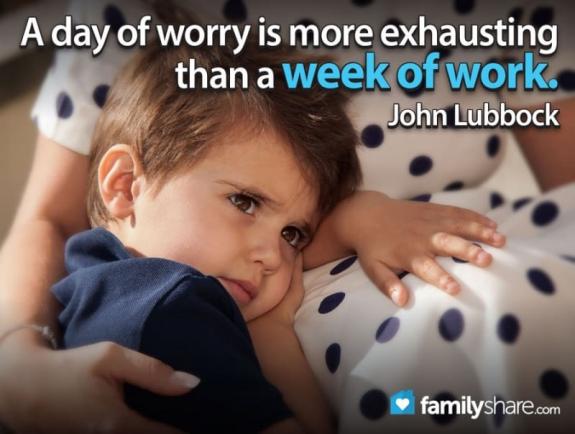
Everybody worries sometimes, including our children. Kids worry about school, making friends, fitting in, bullies and more. However, some kids are natural-born worriers, and the smallest disruptions in their routines can throw them off.
Here are some suggestions that will help your worrywart cope a little better.
Encourage independence
Take advantage of those toddler years when your son insists, "I do it!"� Let him. Offer assistance when necessary, but let him choose his clothes, dress himself and help you clean and make lunch. As he grows, increase his responsibilities. Expose him to new experiences, and praise him for trying something new.
Anxiety comes from feeling helpless. As your child becomes capable and competent, he will learn that he is not helpless.
Invite your child to talk about it
Be available and take an interest in your child's activities. If you sense she may be worried about something, ask her about it. You may be able to address a worry before your child works herself up too much. Kids Health points out that sometimes, just talking about the problem can make your child feel better.
Don't dismiss your child's feelings. Her concerns may seem silly to you, but they are real to her. Don't laugh at or brush off her emotions. Tell her you understand why she feels that way. Comfort her and let her know it will be all right.
Help him explore different possibilities
The worrying child's brain will automatically jump to the worst possible conclusion. Are you late to pick your son up from school? Then you must have been in a car accident, and he will have to camp out in his classroom forever.
Help your child think of other possibilities. Ask him, "Why do you think I might be late to pick you up from school?"� Help him come up with ideas such as you fell asleep, you were stuck on the phone, you had to go to the bathroom first or you were just getting home from the store. Help him to see which possibilities are most likely, and emphasize that the disaster scenarios are very, very unlikely to happen.
Teach problem-solving skills
Go through possible scenarios, and ask your child, "What could you do?"� For example, if you are late to pick your child up from school, she could go to the office and ask to call you. She could also ask a teacher for help or call a trusted family friend.
Remind your child that grown-ups are here to help
Whether it is a small problem (like leaving his homework at school) or a big problem (like a natural disaster) there are always adults around to help. Remind your child of the grown-ups in his life who can help him. Let him know that parents, teachers, coaches, playground monitors and neighbors care about him and will be there when he needs them.
You may have a child who pays a lot of attention to what is going on in the news. Remind him that grown-ups are working to fix the problems that he might hear about. People who own businesses give jobs to people who are out of work. Police officers catch the bad guys and firemen put out fires. Let him know that when he grows up, he will be able to help fix big problems, too.
Set a good example
Pay attention to how you handle problems that crop up in your own life. If you are a worrier, yourself, you may be conveying that concern to your child. Try to project a calm and confident demeanor when you are faced with an unexpected problem.
Family psychologist Shanan R. Raines, Ph.D. Recommends these additional tips:
-
Make sure your child is getting enough sleep.
-
Ensure he is eating enough.
-
Make sure your child gets plenty of sunshine and exercise.
-
Reduce stress by making sure you do not schedule too many activities for your child.
-
Reduce television, video games and other exposure to violence.
-
Do not expose children to news shows.
-
Don't avoid feared activities or experiences.
-
Be patient.
Your child might always be a little more sensitive than others, but with patience and practice, she can learn to face her fears and manage her worry.

